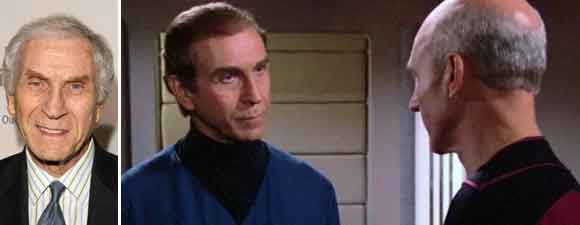Retro Review: The Masterpiece Society
7 min readA genetically engineered human society threatened by a disaster refuses to relocate and resists contact with Starfleet.
Plot Summary: The Enterprise is studying a stellar core fragment when the crew discovers a previously unknown colony of humans on a planet in a path with the fragment. The colony’s leader, Conor, is initially reluctant even to talk to Picard, though once the danger is made clear to him, he reluctantly allows an away team to beam down. Riker and Troi learn that the colony is a genetically engineered society in which even the plants are part of a carefully designed ecosystem. Conor asks lead scientist Hannah Bates to work with LaForge on finding a solution that will not require the colony’s evacuation. Aboard the Enterprise, LaForge asks Bates whether his embryonic development would have been terminated once it was discovered that he was blind, then realizes that the technology of his VISOR can be used to deflect the stellar core fragment from the colony. Meanwhile, Troi discusses with Conor how the isolation of his society has affected his people. The two admit to a mutual attraction and begin a romance. But Troi realizes that because she is half-Betazoid, she would never be permitted to join the colony. Conor reluctantly agrees to allow dozens of Enterprise crewmembers to shore up the colony’s biosphere, and Bates and LaForge successfully deflect the fragment, but soon afterward, an alarm sounds indicating a biosphere breach. Bates claims that it is serious enough to force evacuation, but LaForge tells her privately that he knows there is no breach, forcing Bates to admit that she wants to leave the colony and believes others should do so as well. Picard visits Conor to say that he will grant passage to Bates and others who wish to depart, though Conor tells him that their perfectly balanced society will never recover from such a loss. After 23 colonists decide to leave, Picard asks Riker whether they have done nearly as much damage to the colony as a collision with a stellar core fragment.
Analysis: “The Masterpiece Society” is a more enjoyable episode than I had remembered. As a commentary on utopianism and genetically engineered people, it’s absurdly simplistic – and unfolds too much like “The Ensigns of Command” – but as a character story, it gives Troi, LaForge, and Picard some nice moments, and the humans from the colony are interesting as well. Maybe the episode merely seems like a vast improvement upon “Violations” – if Troi is going to be involved in an inappropriate romance, at least this is one she chooses, and her attraction is understandable, perhaps even more so given how Jev treated her and how little it seemed to concern the people she worked with. Conor is afraid his society must seem very boring to her, with everything designed to run as smoothly and predictably as possible from jobs to reproduction, but Troi seems to find it comfortable…not someplace she’d want to live forever, yet an interesting and pleasant experiment. Picard isn’t nearly as impressed at first, though strangely he makes no mention of the atrocities committed on Earth in the name of genetic engineering – it’s odd not to hear Khan mentioned under such circumstances. My issue with the crew’s reactions to the society have more to do with how little they try to understand it.
We first meet the open-minded leader Conor, the conservative adviser Benbeck, and the enthusiastic engineer Bates. Yet who decided that such an expansive personality would be the ideal genetic design for the head of the community? Don’t get me wrong, I think it’s wonderful, but in a society founded on specifically conservative ideals, so much so that there has been surprisingly little growth in generations of idyllic existence, it’s a bit of a surprise; the founders might easily have chosen to breed leaders for physical strength or rigidity of opinion. It was a calculated risk to cultivate a leader who would invite outside aid and admire those who brought it. It’s not clear either that Benbeck’s aggressive personality is an ideal match for his role as the judge and interpreter of the founders’ intentions; the abrasiveness isn’t successful at convincing either Conor or the colonists who want to leave of remembering the values with which they were raised. As for Bates, I suppose the best engineers and scientists all have a sort of childlike wonder at new discoveries, but she was probably always a risk to want to move outside the confines of their biodome. And these are just questions about why such traits were chosen; the more complicated question is how, since most research suggests that personality traits are a combination of genetic and social influences. I’m sure it’s relatively easy to breed medical and musical geniuses who love their work, but I shudder to think how the street sweepers are produced, and how they’re convinced that whatever limited gifts they’ve been given should be used to serve in that capacity – it makes me think of the Alphas and Deltas of Aldous Huxley’s Brave New World.
Yet we’re told that this society is utopian, except that a significant number of people want to leave after only a few hours of exposure to the Enterprise crew members. That doesn’t suggest happiness but seething resentment…or maybe not seething, if they’ve managed to breed out violent impulses, yet those people agree to leave the only home and family they have ever known, in all likelihood forever. Has no one ever expressed a wish to do more or be something different, to Conor or to whatever sort of counselors his society has? I simply don’t believe his claim that there are never abrupt upheavals – accidents that leave some people dead and other people devastated. He answers the question in terms of the society’s ability to adapt, not in terms of individual response, and there it reminds me of another dystopia, Lois Lowry’s The Giver, in which people have given up so much of what makes them human to live in peace that their lives seem colorless and pointless. It’s the opposite of the power struggles from Khan’s era where super-humans fought for dominance; these people have had all ambition and creativity drained out of them, even if some of them are genetically predisposed to play Chopin preludes very prettily.
Fortunately, Conor suffers from the same messy human emotions that have brought down dictators and paupers alike. He’s hot for a woman he’s not supposed to want – she’s not even entirely human, genetically – and rather than fight those feelings, he’s titillated when she says it would be wrong and he is forced to agree. It’s a cliche, yet not difficult to believe in these circumstances. Troi seems more attracted to the leader than the would-be-rebel, yet as she tells Picard – who is somehow oblivious to her crush on Conor – she does admire him and his passion for doing the right thing by his people. When she is forced to confess her unprofessional behavior to the captain, he is unfazed, telling her to take a deep breath and offering to let her back out from returning to the colony; it’s as if that weakness is easier for him to understand than admiring the leader of the genetic engineers. Yet in the end, Picard has the gravest reservations about the likely downfall of the colony, comparing his decision to take colonists offworld to violating the Prime Directive.
It figures that LaForge is willing to fight for Bates and doesn’t call her on her lie in front of others. He understands that he wouldn’t even have been born on her world, one of the many places her utopia breaks down: not only can’t I believe that no baby is ever born with a problem that occurs during labor and delivery, or with an unpredictable personality disorder like Reg Barclay’s, but I don’t believe that every woman would agree to terminate every pregnancy that showed some deviation, no matter how indoctrinated these people have been in the idea of producing “perfect” children. LaForge expresses more disgust at the fact that the founders of the colony took it upon themselves to decide who did and did not have something to contribute. He loves that a blind man’s VISOR provides to clue to saving Bates’ society, and she takes the lesson from this to heart: “If we’re so brilliant, how come we didn’t invent any of these things?” To her, it’s like realizing she’s been living in the Dark Ages, or “a 200 year old joke.” It’s no wonder that LaForge is willing to take her request for asylum to Picard, and watching their relationship develop, it’s a pity Bates can’t stay on the Enterprise – she’s one of the smartest female engineers we see on this series and there’s real chemistry, not because the characters are flirting, but because they’re both turned on by solving the same sorts of problems.






